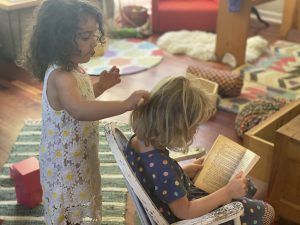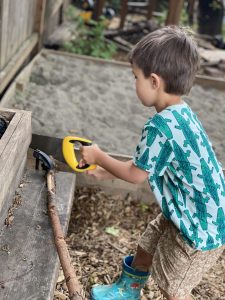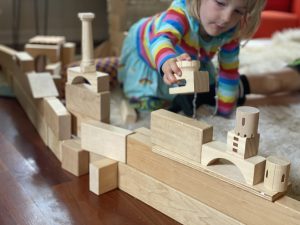 In blending Waldorf and Montessori, we seek to blur the line between work and play by offering clear options and then allowing children to freely choose their own activities. The rhythm of our day is strongly informed by the Waldorf approach, and within that rhythm we offer Montessori activities for supporting healthy development, independence, and love of learning. Common elements from both Waldorf and Montessori classrooms are woven into our school days. Though the complete forms of both approaches cannot be combined, as they do contradict each other in some ways, Bower Tree finds a middle path by selecting important aspects of each approach and emphasizing the many ways in which they overlap.
In blending Waldorf and Montessori, we seek to blur the line between work and play by offering clear options and then allowing children to freely choose their own activities. The rhythm of our day is strongly informed by the Waldorf approach, and within that rhythm we offer Montessori activities for supporting healthy development, independence, and love of learning. Common elements from both Waldorf and Montessori classrooms are woven into our school days. Though the complete forms of both approaches cannot be combined, as they do contradict each other in some ways, Bower Tree finds a middle path by selecting important aspects of each approach and emphasizing the many ways in which they overlap.
Like the founders of both Waldorf and Montessori education, we honor the spirit of the child and seek to gently guide its unfolding. Also like both founders, we believe in the therapeutic and developmental value of focused activity done with the hands using natural materials– as well as a beautiful, thoughtfully prepared environment, practical life activities such as sewing, and gardening, and cleaning, and abundant opportunity for outdoor exploration and gross motor exercise.
Waldorf education is characterized by a focus on the child’s imagination, free play, theatrical storytelling, natural materials, gentle sung transitions to move from one part of the day to the next, and collective activities such as baking, painting, circle time, and story time. Waldorf preschools and kindergartens do not teach early literacy or numeracy, instead putting emphasis on the creation of a dreamy, magical atmosphere to protect the child from overstimulation as they integrate into their world.
 Montessori education is characterized by respect for the child’s inner promptings to develop themselves based on hands-on sensory engagement with their environment. The role of the teacher is to prepare the environment and guide children through it, so that they can independently meet their own developmental needs, mostly by working with prepared activities taken from the classroom shelves. Montessori is reality-based, placing emphasis on real work with real materials rather than on pretend play. Children are introduced to prepared activities by means of clear demonstrations (lessons), and supported as they move through the materials at their own pace toward improved coordination, refinement of the senses, literacy, numeracy, and a basic understanding of geography, geometry, botany, and more.
Montessori education is characterized by respect for the child’s inner promptings to develop themselves based on hands-on sensory engagement with their environment. The role of the teacher is to prepare the environment and guide children through it, so that they can independently meet their own developmental needs, mostly by working with prepared activities taken from the classroom shelves. Montessori is reality-based, placing emphasis on real work with real materials rather than on pretend play. Children are introduced to prepared activities by means of clear demonstrations (lessons), and supported as they move through the materials at their own pace toward improved coordination, refinement of the senses, literacy, numeracy, and a basic understanding of geography, geometry, botany, and more.
 At Bower Tree, we draw on techniques from both Montessori and Waldorf to craft a well-rounded and nourishing nature-based curriculum for early childhood. We offer collective activities such as baking, painting, and circle time, though the children do not have to join if they are deeply engaged in another activity. Our school offers a variety of ways for the children to work with their hands, and also invites them to relax in comfortable, beautiful surroundings. We strongly believe in supporting the development of concentration, social-emotional literacy, imagination, coordination, and the senses, all of which are key foundations for future academic learning and personal thriving. Based on our observations of each child’s interests and readiness, we offer Montessori lessons to help refine the senses and support the development of functional independence. However, free play is always an option, and our days are permeated by seasonally based Waldorf-style singing, verses, and stories that hold all of our activities within the sweet, magical atmosphere of a Waldorf preschool.
At Bower Tree, we draw on techniques from both Montessori and Waldorf to craft a well-rounded and nourishing nature-based curriculum for early childhood. We offer collective activities such as baking, painting, and circle time, though the children do not have to join if they are deeply engaged in another activity. Our school offers a variety of ways for the children to work with their hands, and also invites them to relax in comfortable, beautiful surroundings. We strongly believe in supporting the development of concentration, social-emotional literacy, imagination, coordination, and the senses, all of which are key foundations for future academic learning and personal thriving. Based on our observations of each child’s interests and readiness, we offer Montessori lessons to help refine the senses and support the development of functional independence. However, free play is always an option, and our days are permeated by seasonally based Waldorf-style singing, verses, and stories that hold all of our activities within the sweet, magical atmosphere of a Waldorf preschool.

